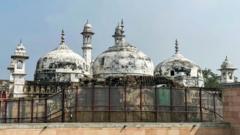India is currently embroiled in a legal dispute concerning the Places of Worship (Special Provisions) Act, 1991, with various petitions challenging this pivotal law before the Supreme Court. The law prohibits altering the character of any religious site as it existed on August 15, 1947, and includes historical exceptions for specific cases like the Babri Masjid. The Act was enacted in response to growing religious tensions, particularly surrounding the Babri Masjid, which was demolished by Hindu activists in 1992, leading to significant violence and loss of life across the nation.
In recent hearings, a member of Prime Minister Narendra Modi's Bharatiya Janata Party (BJP) has argued that the 1991 law infringes upon religious freedom and constitutional secularism. This assertion comes at a time when Hindu groups have initiated legal claims to many mosques, asserting they were erected over destroyed temples. Opposition leaders and Muslim organizations are defending the law, emphasizing its importance in protecting minority worship sites in a predominantly Hindu nation. They express concern that if the law is overruled or modified, it could trigger widespread disputes and exacerbate communal tensions between Hindus and Muslims.
Anticipation surrounds the Supreme Court's deliberations, especially with its recent directive to halt new cases that challenge the ownership of religious structures until further notice. Scheduled for a hearing in February, the Court's decision will directly affect several contested sites, including Gyanvapi and Shahi Eidgah, which are located in key religious cities and have been the center of heated legal battles.
The law was introduced in a context of rising religious violence associated with the campaign for the construction of a temple at the former mosque site in Ayodhya. Home Minister SB Chavan, during the bill's introduction, warned of the dangers posed by intolerant factions seeking to convert religious places and incite further conflict. The BJP, then in opposition, criticized the legislation as appeasement towards minorities, fearing it could deepen Hindu-Muslim divisions.
Recent events have underscored the ongoing relevance of the Act. A court in Rajasthan recently allowed a petition asserting that a Hindu temple lies beneath the Ajmer Sharif shrine, while violence erupted in Sambhal over a mosque-related survey. The complexities of these historical claims complicate efforts toward reconciliation and may fuel further unrest.
The Supreme Court's ruling on the Places of Worship Act could set a precedent for how India navigates its intricate tapestry of communal relations, including the ever-present specter of historical grievances. Critics warn that legitimizing challenges to the law could lead to violence and a resurgence of hostilities reminiscent of past religious strife. The upcoming hearings promise to be a critical juncture in India's legal and societal discourse on religious freedom, identity, and coexistence.



















